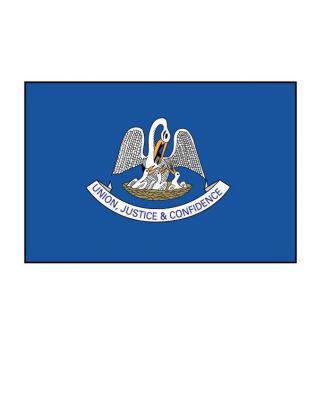
Jeremy Alford/Lapolitics
Transportation and Development Secretary Shawn Wilson said the construction backlog for the state now stands at $13.4 billion, which is an increase from where it stood when he was first took over the department in January 2016.
“People need to understand the backlog is really unmet needs on our system today,” Wilson said in an episode of The LaPolitics Report that will be released this week.
So what does that include? According to Wilson it’s the lanes of transportation that take you to and from work and school and all points in between.
“It’s the bridge repairs we need to make,” Wilson added. “I’ve closed — I think I’m on number 43 right now. Folks don’t like that I’m telling them I’m closing bridges. But there’s an impact of that. And I think that’s part of really being transparent is telling people what we’re doing and what are the conditions.”
In fact, roughly 22 percent of the $13.4 billion backlog comes from needed bridge repairs that the state simply cannot afford to underwrite. The waiting list for new interstate lanes and general highway improvements make up the rest of the needs.
The backlog was a major point of contention this year during the debate over a gas tax increase, which lawmakers rejected and Wilson discusses in the upcoming episode of The LaPolitics Report podcast.
“Politically speaking, it’s going to be very difficult to do a gas tax,” the secretary said when asked if another bill would be introduced during the next fiscal session, possibly in 2018.
“The big answer is we haven’t done this for 30 years,” he later added. “We haven’t increased taxes for 30 years for transportation. Everything around us has increased: the cost of doing business, the cost of materials, retirement, health care — all of that’s increased that we have to pay. So I suspect that this is going to be a long course.”
Beer League toasts decision
Civil District Court Judge Clare Jupiter handed down a ruling recently that essentially strikes down a special excise tax, commonly referred to as a “gallonage tax,” that’s being levied in New Orleans on high-alcohol content beverages.
City officials said last week that the decision will be appealed.
The lawsuit was brought in December by the Beer Industry League of Louisiana, the Wine and Spirits Foundation and the Louisiana Restaurant Association. At the time the groups argued that the tax was “invalid and imposed an unlawful burden on the industry.”
If you believe the plaintiffs, the Louisiana Constitution and state statutes limit the taxing authority of municipalities and they contain specific prohibitions upon taxation of the alcoholic beverage industry.
The city, meanwhile, has maintained that its unique Home Rule Charter exempted it from the constitutional and statutory restrictions that applied to other municipalities.
While she has issued a decision on this matter, Judge Jupiter is not done with the case. The same lawsuit seeks to invalidate another “tax,” which is actually a $1,000 processing fee for restaurants and other establishments that are required to obtain a liquor license. The fee is charged in addition to the cost of a license, which ranges between $135 and $500.
Attorneys for the associations — Yvette D’Aunoy and Chais Sweat of the Middleberg Riddle Group — argue that state law specifically limits the amounts a municipality can charge for liquor license fees, and that the city is attempting to skirt those limitations by calling the $1,000 charge a “processing fee.”
Political History: Huey Long’s medical care
Last week marked the 82nd anniversary of the death (Sept. 10, 1935) of a U.S. senator and presidential candidate who went by the moniker of “The Kingfish” — Huey Pierce Long Jr.
While there has been a great deal of speculation over the years about who exactly shot the Kingfish, the issue of his medical care prior to death is often overlooked.
A 2012 article that’s available via the U.S. National Library of Medicine examines the medical care Long received after being shot and the “circumstances that may have ultimately led to his demise, as well as the important questions of whether the care he received was consistent with standards of the time and whether the best available surgical team participated in his care.”
Dr. Michael C. Trotter writes in the article that “politics and medicine were intertwined in this incident, and the Ochsner connections are worth examination in this context.”
The writeup focuses on certain alternative histories, like if the state’s best-known surgeons had arrived on time to operate.
“What if Alton Ochsner had been called and successfully operated and took charge of Long’s care?” Trotter asks in his article. “Was Ochsner not considered for consultation because of politics, or was it just an oversight because of the chaos of the situation? Clearly Long would have benefitted from the talents of a surgeon such as Ochsner. The attributes of a great surgeon—maturity of judgment, dexterity of hand, and serenity in crisis — appear to have been absent that night.”
Trotter’s conclusion, though, leaves much to ponder for Long scholars: “It is reasonable to conclude that Long likely died from hypovolemic and/or septic shock due to penetrating abdominal trauma resulting in renal injury superimposed with peritonitis secondary to bowel perforation and aseptic surgical conditions. Expert surgical care unhindered by political constraints may have provided the best opportunity for a successful outcome. Although medical standards of care were evolving in 1935, sufficient existing expertise appears to have been reasonably available. However, this expertise was not available to Huey Long on that fateful night.”
They Said It
“I don’t find much to like about the Democratic Party.”
—Louisiana 1st Circuit Court of Appeal Judge J. Michael McDonald, in The Advocate
“Among the things I’ve heard from the Legislature, encouragement on money would not be one of them.”
—Louisiana Community and Technical College System President Monty Sullivan, in The Times-Picayune
For more Louisiana political news, visit www.LaPolitics.com or follow Jeremy Alford on Twitter @LaPoliticsNow.
